futility
LAST YEAR on NPR’s “All Things Considered,” I heard the story of Teresa MacBain, a United Methodist pastor who came to the conclusion she was an atheist. The situation was scary and awkward for her. Who could she tell? What would she do now for a living?
She wasn’t trained for any other occupation, but neither could she continue her double life of preaching and public praying while knowing she didn’t believe in any of it.
Lacking someone to confide in, MacBain secretly confessed to her iPhone, “Sometimes I think to myself: If I could just go back a few years and not ask the questions and just be one of the sheep and blindly follow and not know the truth, it would be so much easier. I’d just keep my job. But I can’t do that. I know it’s a lie. I know it’s false.” Eventually, she left the ministry.
As I listened to MacBain’s interview, I empathized with her. After 30 years of serving as a Mennonite pastor, I often wonder whether I still believe the things I’ve always said I believed. My questions about God have become deeper, while my previous answers now sound shallow. The thought that I might not believe in God is frightening. It threatens my identity and worldview—not to mention my occupation. And yet I haven’t arrived at MacBain’s atheism. Instead, my doubts have been folded into my faith.

Photo via E. O. / Shutterstock
In Christian confession, Good Friday is the day of loss and defeat; Sunday is the day of recovery and victory. Friday and Sunday summarize the drama of the gospel that continues to be re-performed, always again, in the life of faith. In the long gospel reading of the lectionary for this week (Matthew 27:11-54), we hear the Friday element of that drama: the moment when Jesus cries out to God in abandonment (Matthew 27: 46). This reading does not carry us, for this day, toward the Sunday victory, except for the anticipatory assertion of the Roman soldier who recognized that Jesus is the power of God for new life in the world (verse 54). Given that anticipation, the reading invites the church to walk into the deep loss in hope of walking into the new life that will come at the end of the drama.